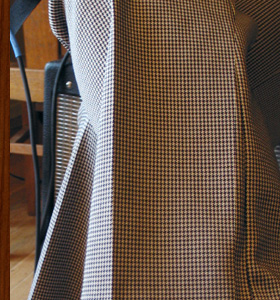[Suddenly changing subject.] I'm gonna make an album about this book, "Three Guineas" by Virginia Woolf, because it's about nationalism, and links feminism with resistance to patriotism.
Tatone: That's very timely.
Dougher: Very timely. It's a very excellent book. I also want to be a country music songwriter, but I don't know how that's gonna work yet. I feel like I need to meet some people in Nashville for that to happen.
Tatone: Or just move there.
Dougher: Yeah, but I don't want to move there. I'd spend time there, but I don't want to move there. I have this idealistic vision of myself as this incredibly successful songwriter. Like, Shania Twain sings my songs and then meanwhile I'm writing albums based on Virginia Woolf. This won't be commercially viable, but it's important to me.
Tatone: That's interesting, it could work.
Dougher: It could work if I knew anybody who did it. I don't know jack shit about Nashville. Mostly, I just read a lot of magazines and books about it. It's a whole other mode of music-making where I'd have to hawk it, and I'm not sure how to do that. Even though I realize that one talent I have is songwriting and I could make money doing that, I don't know exactly how to manifest that. I need a Nashville manager [laughing] or someone who tells me what to do and how to do it. When I started in the milieu that I started in, in the early '90s here, I was totally amazed and fascinated by like, "How do you put out a seven-inch?" But now I know how to put out a seven-inch, I know how to put out a record, I can do all of this. Now I want to try this other new thing.
Tatone: So you'd be like more behind the scenes?
Dougher: Totally. Just me playing the piano and sending off demos to the Dixie Chicks [laughing].
Tatone: Then you'd be so much more connected to the disaster of the music world.
Dougher: I would be, but on the other hand, I also view that role of songwriter as actually potentially transformative. I would be more involved with the crunching machine.
Actually country music is a lot more inviting, [though] sexist in its own ways. But it provides a way for speaking for female musicians, female artists, that is not available in pop, top-40 pop. There's a 50-year-old woman and a 20-year-old woman who are on the [country] chart. Their experiences speak to different segments of the population; hence their market share is a lot more open.
Tatone: So you could change it from the inside?
Dougher: Yeah, exactly. But you know what? Another weird thing — I'm not on a crusade to change country music, but I see it as a genre that is possible to make changes in. I don't really see a model coming forth in, say, top-40 pop that is potentially transformative. Maybe I'm again woefully misguided, but I just don't see that. I actually think hip-hop and country share a lot of — they're both genres that are popular and reflect lived experience, and as that experience changes, it changes the music. If you know anybody in Nashville, send them my way.
Monday, February 2, 2026 |
||

